Why is My Bernese Mountain Dog Panting SO Much?
Panting can be a normal part of a dog’s behavior, but it can also be an indication that something is not quite right with your Bernese Mountain Dog. These large, friendly dogs are known for their gentle nature and love of the outdoors, but like any other dog breed, they can experience various levels of stress, anxiety, or physical ailments that could lead to excessive panting.
This article will discuss some of the potential reasons your Bernese Mountain Dog is panting and what you can do to help them feel more comfortable.
It’s important to remember that panting is a natural way for dogs to cool off, especially during hot weather or after exercising. Bernese Mountain Dogs, with their thick fur coat, are far more temperature-sensitive than other breeds. Therefore, it’s essential to monitor your dog during summer months or when they’ve been active to ensure they don’t overheat.
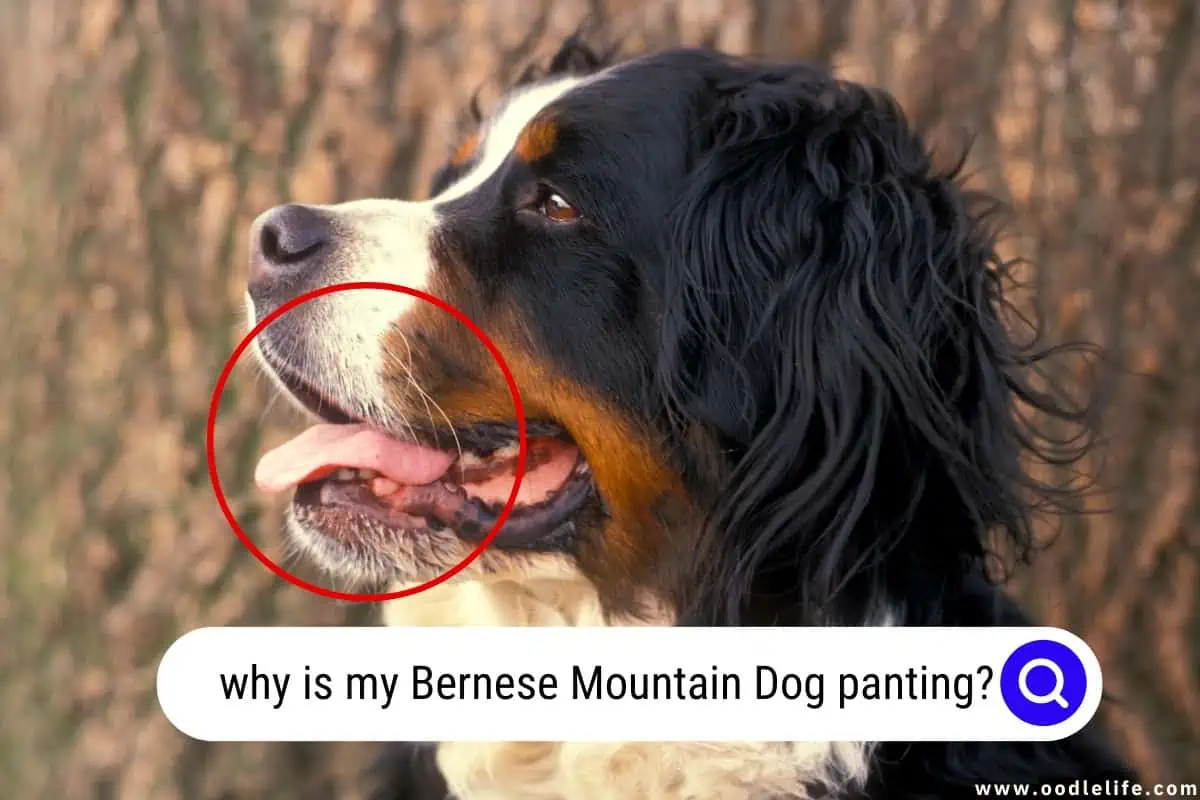
In some cases, a Bernese Mountain Dog might experience a sudden onset of fear and panic, which can manifest in behaviors such as excessive panting or cowering.
Of course, not all panting is related to temperature or stress. Some panting might be indicative of a more serious health issue, such as heart problems, respiratory disorders, or even certain types of cancer. In the case of Bernese Mountain Dogs, they can be more prone to specific conditions like histiocytic sarcoma, which could also present symptoms like panting.
If you’re concerned about your dog’s panting, it’s crucial to consult with a veterinarian to rule out any underlying health issues.
Understanding Panting in Dogs
When it comes to our furry friends, panting is a pretty common sight. It’s particularly noticeable in the lovable Bernese Mountain Dog, a breed that’s known for being both hard-working and affectionate. In this section, we’ll explore the different types of panting and what they could mean for your beloved canine companion.
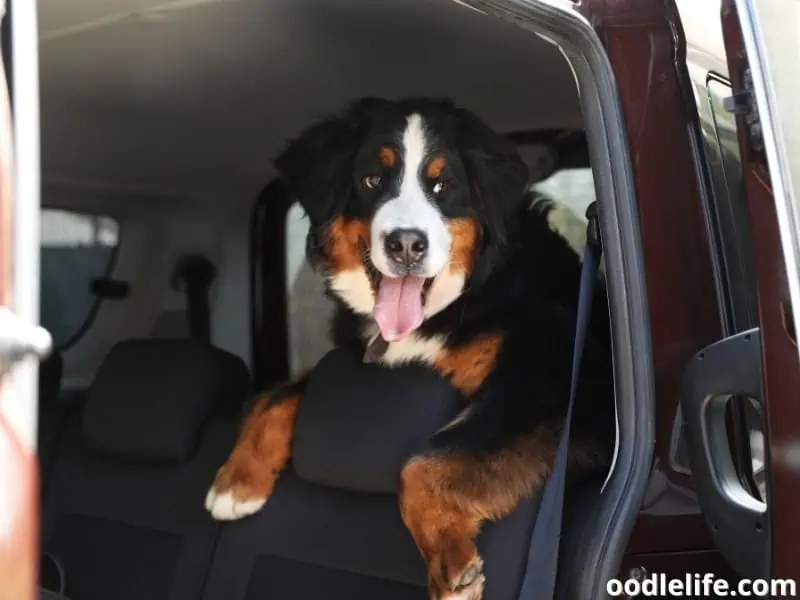
Normal Panting
Panting is a natural way for dogs to regulate their body temperature. Unlike humans, who sweat to cool down, dogs rely on panting to release excess heat. In this process, your dog will take quick, shallow breaths, which helps evaporate moisture from their tongue, nasal passages, and the lining of their lungs.
This evaporation lowers their body temperature, providing relief on those hot summer days or after a vigorous game of fetch.
Normal panting is generally no cause for concern and is something you’ll probably see your Bernese Mountain Dog doing quite often. It’s important to ensure your dog has access to fresh water during these panting sessions to avoid dehydration.
Heavy Panting
Heavy panting, on the other hand, can be a sign that something more serious is going on. This type of panting can be characterized by deeper, louder breaths and may be accompanied by signs of distress, such as restlessness or agitation.
Bernese Mountain Dogs, as with other breeds, can experience heavy panting due to factors such as stress, anxiety, or even pain. Additionally, overheating can lead to heavy panting in any dog, and since Bernese Mountain Dogs have a thick double coat, they may be more prone to overheating, especially in warmer climates.
If you notice your Bernese Mountain Dog suddenly starts panting heavily without a clear trigger, it’s important to monitor them closely for any accompanying symptoms such as lethargy or loss of appetite. In these cases, it’s best to consult with your veterinarian to rule out any potential health issues.
In conclusion, understanding the difference between normal panting and heavy panting can help you keep your Bernese Mountain Dog happy and healthy. Always remember to keep an eye on your furry friend, and don’t hesitate to seek professional advice if you’re ever unsure about your dog’s well-being.
Causes of Excessive Panting
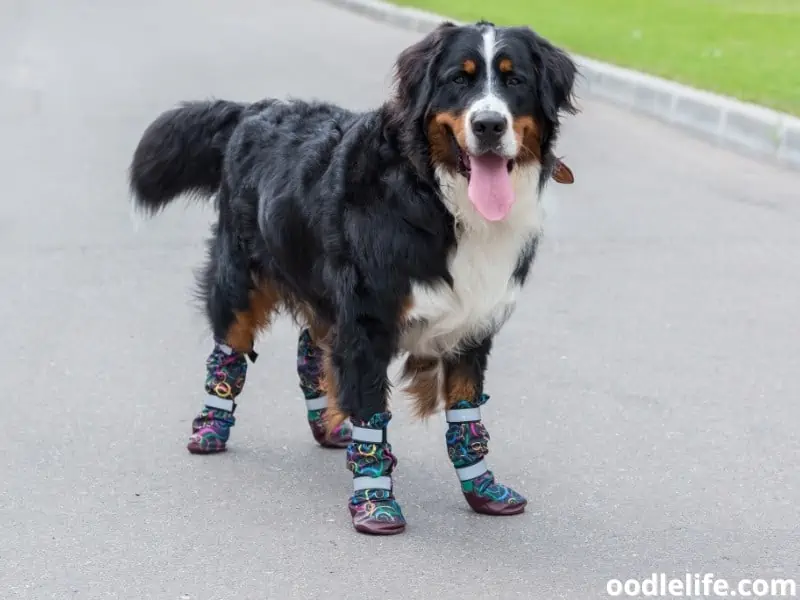
Heatstroke
Heatstroke can be a common reason for a Bernese Mountain Dog to pant excessively, as they have a thick double coat that makes them more susceptible to overheating. Signs of heatstroke include heavy panting, drooling, and lethargy. To help prevent heatstroke, provide your dog with plenty of shade and water, especially during hot weather.
Dehydration
Just like humans, dogs can become dehydrated when they don’t have enough water, which can lead to excessive panting. Signs of dehydration in dogs include panting, a dry nose, and sunken eyes. To avoid dehydration, make sure your Bernese Mountain Dog always has access to fresh, cool water.
Exercise
Bernese Mountain Dogs are an active breed, and it’s natural for them to pant after a vigorous exercise session. However, excessive panting could indicate that the exercise is too intense or the dog is too exhausted. If this is the case, consider adjusting the exercise routine or take breaks in between to allow your dog to rest and hydrate.
Anxiety
Anxiety can cause a Bernese Mountain Dog to pant excessively. This could be due to various reasons like nervousness during a visit to the veterinarian, thunderstorms, or unfamiliar situations. It’s important to identify potential sources of anxiety and help your dog cope with them, which may include training, comforting, or using anxiety-reducing aids like calming collars.
Pain
If your Bernese Mountain Dog is panting excessively and there’s no apparent reason, pain is another possible cause. Pain can stem from injury, trauma, or underlying health problems. If you suspect that your dog is in pain, consult your veterinarian to determine the source and appropriate treatment.
Disease
Certain diseases can cause excessive panting in dogs, such as canine atrial fibrillation or respiratory issues. If you notice other symptoms like coughing, vomiting, or general changes in behavior, it’s crucial to consult your veterinarian to identify and address the underlying health issue causing the excessive panting.
Recognizing Common Symptoms
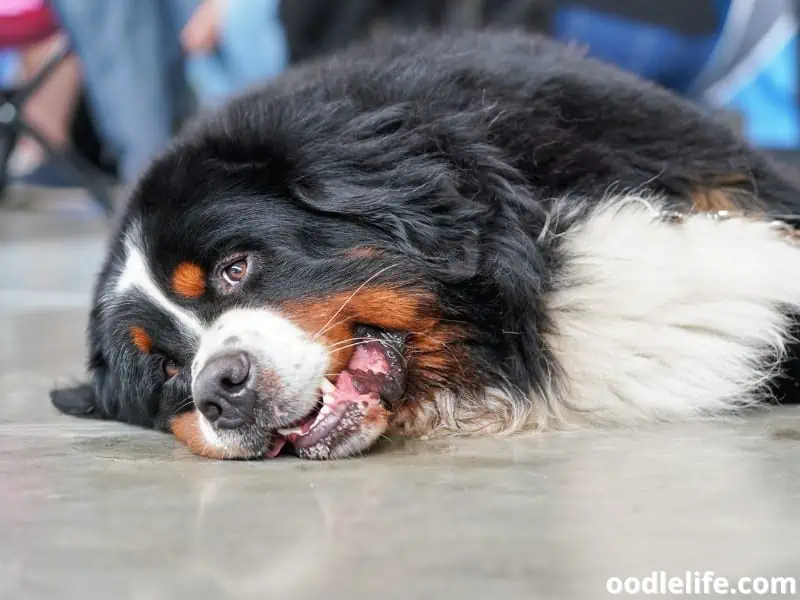
Coughing and Vomiting
Bernese Mountain Dogs, like any other dog breed, may experience bouts of coughing or vomiting. If your furry companion seems to be developing a cough or having episodes of vomiting followed by excessive panting, it might be time to consult a veterinarian. Keep in mind that occasional vomiting from overeating or eating grass is normal for canines.
However, if it becomes a regular occurrence, there could be an underlying issue that your vet can help identify.
Diarrhea
Diarrhea can be quite a messy and stressful problem for both you and your Bernese Mountain Dog. While diarrhea may seem like just an inconvenience, it could signal a more significant health issue, especially if accompanied by panting. Causes of diarrhea can range from dietary indiscretions or a change in food to bacterial infections or parasites.
Be sure to monitor your dog’s water intake, as dehydration is a risk during bouts of diarrhea. If diarrhea persists, make sure to consult with your vet to determine the cause and proper treatment.
Whining and Pacing
When your Bernese starts whining and pacing around the house, chances are they’re trying to tell you something. Panting, combined with whining and pacing, could be a sign of pain or discomfort. Your dog might be experiencing joint or muscle pain, gastrointestinal issues, or an injury.
Keep an ear out for any changes in the pitch or frequency of their whine, as this may be a further indicator of the severity of their ailment. Seeking advice from your vet is recommended to address the underlying issue.
Lethargy and Loss of Appetite
A Bernese Mountain Dog that’s experiencing lethargy and a loss of appetite could be dealing with a health concern. If your dog seems uninterested in their food or unwilling to engage in activities they usually enjoy, it’s crucial to take note of their panting as well. Lethargy and appetite loss can be attributed to a variety of reasons, including illness, stress, or even medication side effects.
To give your four-legged friend the best chance at bouncing back, consult with your veterinarian to determine what could be causing this change in behavior.
Specific Breed Considerations
Bernese Mountain Dogs and Panting
Bernese Mountain Dogs are prone to panting more than some other breeds, mainly because of their heavy coat. This heavy coat is great for keeping them warm in colder climates, but it can also make them overheat easily, especially during warmer months. Regular brushing, providing plenty of shade and access to fresh water, and avoiding exercising during the hottest parts of the day can help to keep your furry friend cool and minimize excessive panting.
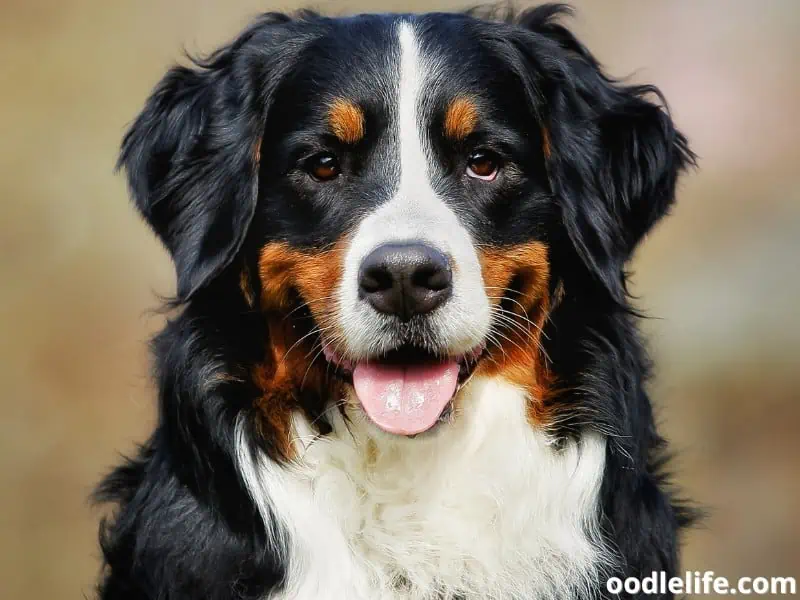
Another factor to consider is that Bernese Mountain Dogs are prone to certain medical conditions that can lead to panting. For example, they might be more likely to experience heart or joint issues, such as hip dysplasia. If you notice that your Bernese Mountain Dog is panting excessively or seems to be in pain, consult with your veterinarian to rule out any underlying health problems.
Short Snouts and Airway Issues
While Bernese Mountain Dogs don’t have short snouts, other breeds like Pugs and Bulldogs are known for their shortened snouts, making them more prone to airway issues. This can reduce their ability to cool down effectively by panting and can make them more susceptible to overheating.
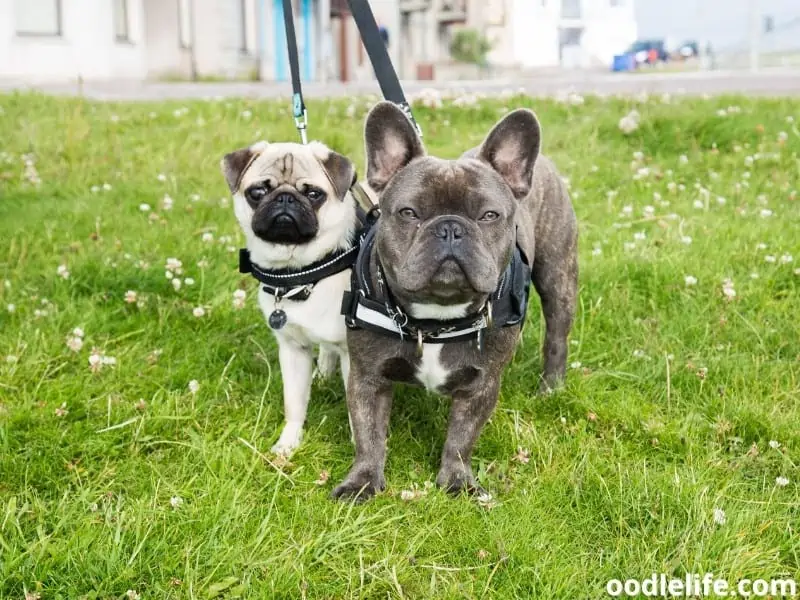
Dogs with short snouts, known as brachycephalic breeds, often have smaller nostrils and elongated soft palates, which make it more challenging for them to breathe. This can result in increased panting as they work harder to draw in air. If you own a dog with a short snout, it’s important to be extra vigilant in monitoring their breathing and ensuring they don’t overheat.
In summary, panting in Bernese Mountain Dogs can be influenced by their heavy coat and potential health issues, while breeds with short snouts like Pugs and Bulldogs may experience panting due to airway difficulties. By keeping an eye on your dog’s panting and taking steps to keep them cool and comfortable, you can help ensure their health and well-being.
Preventing and Addressing Panting Issues

Providing Shade and Water
One of the simplest ways to help your Bernese Mountain Dog stay cool and avoid excessive panting is by ensuring they have access to shade and water. These gentle giants love to be outside, but the heat can be a bit too much for their thick coats. Set up shady spots in your yard or take breaks under trees during summer walks.
A shallow kiddie pool filled with water can also serve as a fun way for your dog to cool off. Remember to always carry a water bottle and portable dog bowl for hydration on longer outings.
Minimizing Stress and Anxiety
Dogs, like humans, can experience stress and anxiety, which can lead to panting. To help your Bernese Mountain Dog stay calm and relaxed, create a comfortable environment in your home. Avoid shouting, sudden loud noises, or exposure to unfamiliar situations that could cause distress.
Provide your dog with toys and engaging activities that keep them mentally stimulated. It’s essential to establish routines, as predictability reduces anxiety.
When your dog needs to visit places that typically cause stress, like the vet or groomer, try to make these experiences as positive as possible. Use treats and praise to reward calm behavior, and practice gradual desensitizations to stressors when appropriate.
Addressing Health Problems
Some health issues can cause panting in dogs, including overheating, heart issues, pain, or respiratory problems. It’s essential to monitor your Bernese Mountain Dog’s panting patterns and be aware of any sudden changes. If your dog’s panting seems excessive, accompanied by other symptoms, or occurs during cooler weather, consult your veterinarian promptly.
In cases where a health problem is identified, follow your vet’s recommendations to address the issue and reduce panting. Regular check-ups and staying up-to-date with vaccinations will also contribute to your dog’s overall health and well-being.
When to Consult Your Veterinarian?
As a Bernese Mountain Dog owner, it’s essential to know when your dog’s panting may indicate a more serious health issue. In this section, we’ll examine the signs that warrant a visit to your veterinarian.
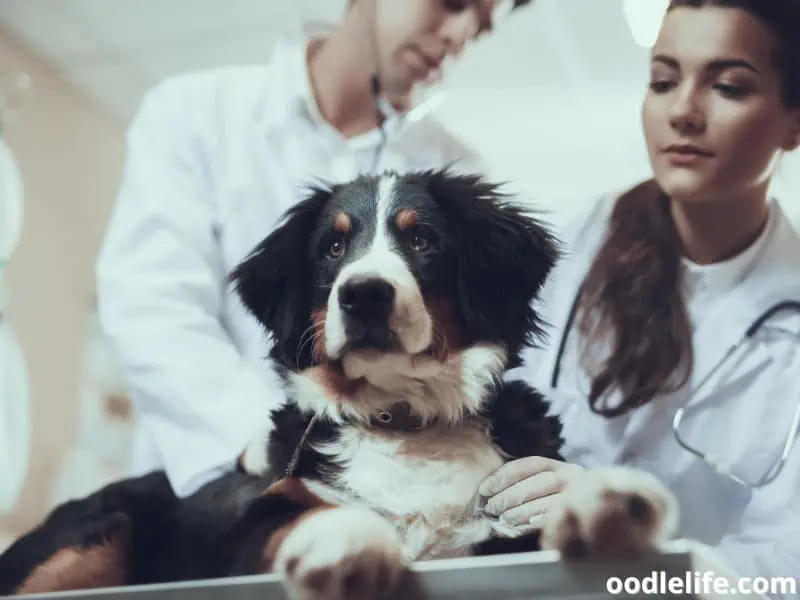
Signs of Serious Health Issues
While panting is a normal behavior for dogs to regulate their body temperature, there are certain instances when excessive panting might signal an underlying health issue. Here are some examples of concerning symptoms that may accompany panting and warrant a trip to the veterinarian:
- Abnormal behaviors: If your dog’s panting is accompanied by restlessness, pacing, or refusal to lie down, this could indicate discomfort or pain.
- Limping: If your Bernese Mountain Dog is limping and panting, it’s possible that they’re experiencing pain or discomfort in their leg or joint.
- Excessive licking or biting: Dogs may lick or bite their skin in an attempt to relieve itching, pain, or discomfort. If your dog is frequently licking and panting, it’s essential to consult your veterinarian to identify and address the cause.
- Excessive drooling: While some drool is normal, excessive drooling in combination with panting could be a sign of an underlying health issue, such as dental problems or gastrointestinal distress.
In conclusion, keeping an eye on your Bernese Mountain Dog’s panting behavior is crucial for their overall well-being. Always consult your veterinarian if you notice any concerning symptoms accompanying your dog’s panting. Regular veterinary check-ups are key to maintaining your furry friend’s optimal health and happiness.